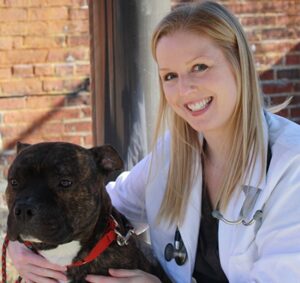-
Adopt
-
Veterinary Care
Services
Client Information
- What to Expect – Angell Boston
- Client Rights and Responsibilities
- Payments / Financial Assistance
- Pharmacy
- Client Policies
- Our Doctors
- Grief Support / Counseling
- Directions and Parking
- Helpful “How-to” Pet Care
Online Payments
Emergency: Boston
Emergency: Waltham
Poison Control Hotline
-
Programs & Resources
- Careers
-
Donate Now
 By Jessica Hamilton Seid, DVM
By Jessica Hamilton Seid, DVM
angell.org/emergency
emergency@angell.org
781-902-8400
Due to many high-profile suicides and the rise of social media victimization, the issue of wellness and mental health have become an emerging hot topic in veterinary medicine. Veterinary professionals, as a whole, are commonly self-described perfectionists with a tremendous fear of failure, which is of no surprise as the field is highly competitive. Unfortunately, with this mindset, comes an increased level of anxiety and thus an increased risk for depression and other psychological disorders.
We enter our profession eagerly, passionate about helping animals, and with the idealization that every day would be emotionally fulfilling instead of draining. We pictured that our days would be hallmarked by making the “big save:” sending an animal, that was very ill or significantly injured, back home with their family. However, when many of us started veterinary school, we didn’t know about the other elements of our profession that could negatively affect our well-being and lives in general. Veterinary training is challenging, competitive, and expensive, leaving many of us with large amounts of debt that we may not be able to pay due to the incongruity between the average graduating debt and starting salaries. This coupled with the stress of challenging medical cases, euthanasia, disgruntled clients, and long working hours with few breaks adversely affect our mental well-being and physical health. Fortunately, veterinary leaders along with mental health professionals are now actively making improving veterinary well-being a priority. While this is great news, it is still our responsibility to focus on our own mental and physical well-being and to work together towards goals that can help us to decrease stress and burnout.
The realization that our general well-being needs to be improved is the first step in helping the profession be more cognizant of steps that we can take to do better. Unfortunately putting this into action can sometimes be difficult. To help get started, we can create a self-care checklist to help evaluate what we are currently doing well, and to identify areas where we want or need to improve habits that could lead to negative feelings. A Self-Care Checklist published by Veterinary Team Brief is available for download at brief.vet/wellness-checklist to help you think more specifically about current strengths and weaknesses. The first step when doing a self-care checklist is being honest with yourself. Try to be specific about areas that you need or want to improve upon, and revel in your strengths. Do you, like many of us, need to work on saying no or accepting that you do not have to be perfect? Do you make time for exercise and to be present for your family? Your strengths are the start of your path to well-being, but continuing to grow and incorporate other positive habits into your daily life will help guide you to a less stressful and more fulfilling life and career.
Knowing is half the battle, but even with the best intentions, the act of pursuing well-being can be challenging. We understand the necessity of balance, but in many cases, we have a very difficult time achieving or maintaining it. The reward for achieving better balance is significant if we can manage to do it, e.g. decreased risk of injury and illness, enhanced immune function, or being a more productive member of the community. There are numerous areas of wellness that contribute to the overall well-being of a healthy individual which we can focus on to improve our quality of life: occupational wellness, intellectual wellness, spiritual wellness, social wellness, emotional wellness, physical wellness, financial wellness, creative wellness, and environmental wellness. An easy way to start improving your well-being is to do the “3 Good Things a Day” exercise, where you record three positive things that you experience each day. The different subsets of well-being can be used to help guide you as the three “Good Things” do not have to be monumental. It can be something as simple as “I only edited my SOAP notes once” or “I took a short walk at lunch” or as monumental as “I decided to hire a financial planner.” Next to each event, write how you can further implement this good thing into your life in the future or what the particular event means to you. By tracking what is consistently valued in our lives, we can strive to spend more of our energy and time on what is most important.
As quoted in part three of the Wellness Revolution series by Veterinary Team Brief, “By purposely pursuing your values, you will move in a direction congruent with your life goals.” Veterinarians who are able to achieve a sense of balance between work and life by being emotionally aware and flexible when encountering a challenge or failure will have enhanced general well-being. When making decisions, try thinking about what is most important to you (such as kindness, family, fairness), as this will help you to feel more confident about your approach to difficult conversations or situations. Anxiety and stress about these situations are normal, but the goal is to try to not let these get in the way as you move forward with your next case, shift, or day. It is inevitable that we will find ourselves in a situation where we have a troubling ethical dilemma with a case, make a medical error, or have the seemingly impossible medical case. In these situations, we must rationalize and give ourselves permission to be imperfect as we are human. What we do is called “practicing medicine” for a reason and making mistakes, whether we like it or not, helps us to learn to be more adaptive. By being able to accept and quiet the anxiety and stress of a situation while not letting negative thoughts overtake us gives the power of the situation back to us. We are in charge of the train and have to try not to let the passengers, whether identified as difficult or abusive clients, a problematic colleague, emotional situations, or other stressors, take over the train. Self-critical thoughts plague most people, but we can learn to not let them paralyze us by learning to accept that they are normal.
This road to well-being cannot be achieved alone. In a world where life is complicated, even a small event can push even the most resilient person over the edge. In these situations, many of us choose to struggle silently, masking the emotional pain with destructive behaviors like excessive spending, secluding ourselves from friends and loved ones, emotional outbursts, and even alcohol or drug use. If any of these situations sound familiar, it may be time to ask for help. The sooner you reach out and learn new coping strategies, the better and more prepared you will be. As medical professionals, we are not good at asking for help and many times choose to carry our burdens alone. There is also the stigma that reaching out for help symbolizes weakness, but in reality, it is the strongest thing we can do for ourselves, our loved ones, and our colleagues. Reaching out for help can start by talking with a close friend or relative, but in general most people can benefit from having a safe space to openly discuss daily stressors and emotions, which sometimes cannot be achieved unless the listener is an impartial mental health professional. Mental health professionals come in many varieties and finding the best fit for yourself is very important. And just as we prefer seeing a pet at an early stage of illness, seeking help early in your struggles is recommended by mental health professionals. Counseling cannot make our struggles disappear but it can provide us with the tools to cope with our stress and anxiety better and to handle life’s challenges more effectively.
If we as a veterinary community are not taking care of ourselves, then not only does our own mental and physical well-being suffer, but so can our personal and professional lives. This is why being honest with ourselves about our current level of well-being and being committed to developing strategies to improve on the different areas of well-being is important.
Clinician’s Brief. Veterinary Team Brief Wellness Revolution Series. veterinaryteambrief.com. January/February 2017.
